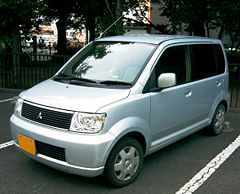Mitsubishi eK
 | |
| Inne nazwy | Nissan Otti[1] |
|---|---|
| Producent | |
| Zaprezentowany | 11 października 2001 |
| Okres produkcji | od 2001 |
| Miejsce produkcji | |
| Poprzednik | |
| Dane techniczne | |
| Segment | |
| Typy nadwozia | 5-drzwiowy hatchback |
| Silniki | Benzynowe: |
| Skrzynia biegów | 3-biegowa automatyczna |
| Napęd | |
| Długość | 3395 mm |
| Szerokość | 1475 mm |
| Wysokość | 1550 mm |
| Masa własna | 790 - 900 kg |
| Dane dodatkowe | |
| Pokrewne | |
| Konkurencja | |
Mitsubishi eK – japoński samochód osobowy zaliczany do segmentu kei-car, produkowany przez Mitsubishi Motors. Nazwa pochodzi od pierwszych liter słów excellent (ang. znakomity) i Keijidōsha (jap. kei-car)[2].
Premiera eK odbyła się 11 października 2001. Samochód oparty jest na ostatniej generacji Mitsubishi Minica i oferowany w 4 wersjach stylistycznych: eK Wagon (wprowadzony do sprzedaży w październiku 2001), eK Sport (wrzesień 2002), eK Classy (maj 2003), eK Active (maj 2004). Modele eK Wagon oraz eK Sport poddano restylizacji i ponownie wprowadzono do sprzedaży 13 września 2006[3].
Przypisy
- ↑ Nissan To Get New eK WAGON Supply from Mitsubishi. Mitsubishi Motors Press Release. [dostęp 2007-07-25]. [zarchiwizowane z tego adresu (18 sierpnia 2006)].
- ↑ Mitsubishi Motors proudly introduces the next standard in mini-cars, the semi-tall "eK-WAGON". Mitsubishi Motors Press Release. [dostęp 2007-07-25]. [zarchiwizowane z tego adresu (20 lipca 2008)].
- ↑ Mitsubishi Motors launches new eK Wagon & eK Sport. Mitsubishi Motors Press Release. [dostęp 2007-07-25]. [zarchiwizowane z tego adresu (28 stycznia 2007)].
Linki zewnętrzne
Media użyte na tej stronie
Autor: S-8500, Licencja: CC-BY-SA-3.0
MITSUBISHI MOTORS JAPAN_ek Wagon first version
Logo for Mitsubishi Group and subsidiary companies.
The name "Mitsubishi" refers to the three-diamond emblem. "Mitsubishi" is a combination of the words "mitsu" and "hishi". "Mitsu" (Kanji: 三) means "three". "Hishi" (Kanji: 菱) means "water chestnut", and Japanese have used the word for a long time to denote a rhombus or diamond shape. Japanese often bend the "h" sound to a "b" sound when it occurs in the middle of a word. So they pronounce the combination of "mitsu" and "hishi" as "mitsubishi".
Yataro Iwasaki, the founder of the old Mitsubishi organization, chose the three-diamond mark as the emblem for his company. The mark is suggestive of the three-leaf crest of the Tosa Clan, Yataro's first employer, and also of the three stacked rhombuses of the Iwasaki family crest.


